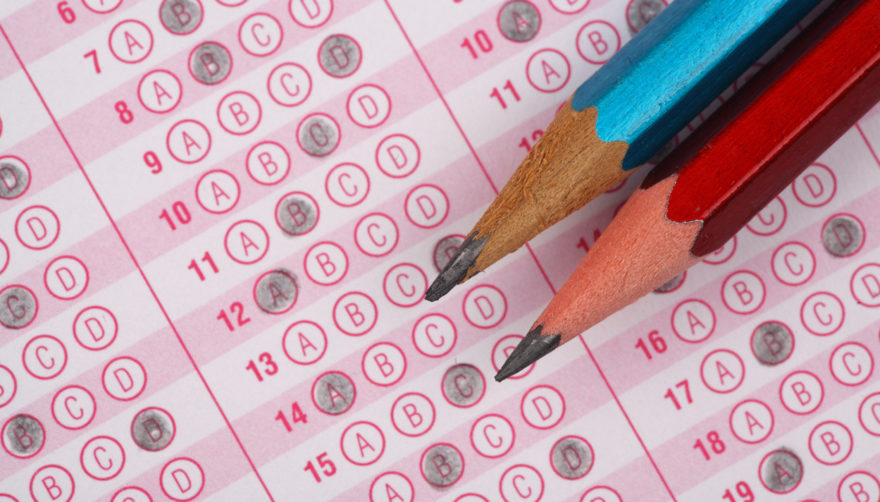Colgate’s New Test Optional Policy: A Step Toward Admissions Equality
In the fall, Colgate’s Office of Admission made the decision to go test-optional for the 2025 applicants due to challenges and inadequate access to standardized testing resources due to the COVID-19 pandemic, and launched a three-year pilot program of this policy to monitor data and determine if this should be a permanent policy at Colgate.
Student Government Association (SGA) Senator and Africana, Latin, Asian and Native American (ALANA) Cultural Center Affairs Board Representative junior Elle Winter expressed her support of the decision as a good start in Diversity, Equity and Inclusion (DEI) efforts as a whole.
“I believe that going test-optional is a step in the right direction. However, this policy needs to be coupled with tangible efforts to create an atmosphere at Colgate that embraces students that identify as Black, Indigenous and people of color (BIPOC). In order to truly create the diverse environment that Colgate touts, action must be taken to spread the scope of Admissions’ outreach and enact change on campus that addresses the needs of current students of color,” Winter said.
“A more equitable Colgate is one that provides students with the opportunity to play to their strengths in a way that seeks to account for the systemic biases that affect underprivileged students,” she added. “Diversifying our student body begins with critically assessing the inadequacies of our admissions system.”
Senior Avery Brook believes standardized tests are hallmarks of an inherently flawed system.
“They definitely favor white communities and those who have the privilege to not only attend great high schools that prepare them for these tests, but those who can afford to take the tests multiple times and who can afford tutors and prep courses. I think that’s a huge reason why standardized tests are not equitable at all because the students who have the means can in a way fund a higher score,” Brook said.
She hopes this policy will not only increase the diversity of the future incoming classes but also increase the range of applicants from diverse communities able to apply to Colgate in general.
“If you don’t feel like you meet the average test score Colgate likes to publicize, you’re a lot less likely to apply even if you are absolutely capable of being a successful student here whatever that may look like. So I think that hopefully that would encourage more people to feel comfortable submitting an application in the first place,” Brook said.
Associate Dean of Admission and Coordinator of Outreach for Opportunity and Inclusion Jamiere Abney explained how this decision has changed the office’s approach to evaluating prospective students.
“In holistic admissions where standardized test scores were never the end all be all, standardized test scores still are keeping certain students out of the applicant pool for us to even think about. [The test-optional policy] pushes your hand as an admissions evaluator to think more broadly about what it means to be academically qualified,” Abney said.
Colgate’s applications doubled in this cycle and the effects of this decision are already apparent.
“This pool is incredible with a lot of really interesting students with more across the board growth in diversity in terms of race and ethnicity, socioeconomics, international applicants and [first-generation] applicants,” Abney said.
Senior Advisor to the President and Assistant Dean for Administrative Advising Christopher Wells explained that standardized testing does not measure academic ability nor future success.
“Standardized tests are really good at measuring how well you do on standardized tests. They also do a good job at measuring whether or not you’ve had expensive test prep but neither of those things are necessary for success at Colgate,” Wells said.
Junior Joanna Rodriguez agreed that this policy will remove some barriers of applying to Colgate.
“The SAT is known to be expensive and although there are fee waivers, the test prep is what costs the most amount of money. Going test-optional removes the system that’s based on how much money you have. Also, standardized testing is known to be a racist exam specifically designed to benefit certain people and exclude others so by making [admissions] test-optional [Colgate] is opening doors for people that were purposefully excluded,” Rodriguez said.
As a part of the DEI Plan, Wells sees this change in admissions as an opportunity to open doors to many diverse identities.
“One of the goals of DEI is to bring in students who can really be successful here but who have been underrepresented over the years. The dropping of the standardized test requirement could increase our capacity to bring in students from underrepresented groups,” Wells said.
Brook also expressed that she believes this policy is more equitable but still has room for possible exclusivity.
“I hope Colgate doesn’t favor the students who hand in their test scores. Being test-optional [means that] you do have the option to hand in test scores and I would hope that Colgate doesn’t favor those applications more because they are getting that extra score,” Brook said.
Abney expressed a possible concern of current students regarding this policy, stating that there are some who may believe admissions will be easier than it should be for these students because of the test-optional policy.
“I hope our community will embrace these students and recognize that they are bringing a lot of great qualities with them,” Abney said.
For students curious about the fairness of the new admissions policy, Wells had some concluding remarks.
“Because of the holistic review, getting into Colgate isn’t going to be any easier and because of the amount of applications we’ve gotten this year, it’s actually going to be much more difficult to get into Colgate,” Wells said.








